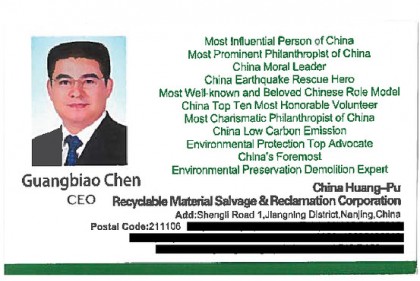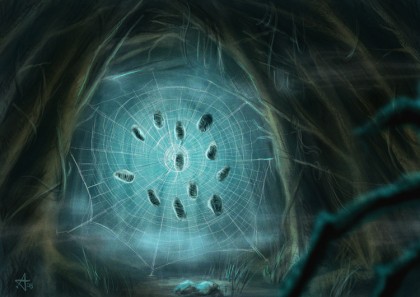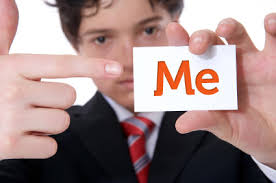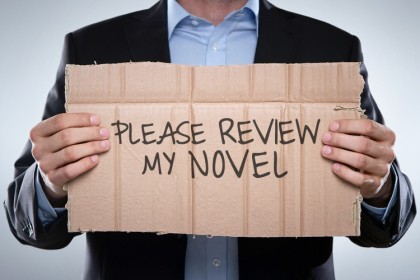What Would Tolkein Do? Mixed Feelings about Self-Promotion
Devra Torres | Jan 21, 2014 | 11 cmts
I first joined Facebook to stalk (and I mean that benevolently) my college-bound daughter. For this I endured some ribbing from her younger brothers and sisters, the usual targets of my anti-social-media tirades. My standard rant went something like this:
Children, beware the subtle snares of self-absorption! They don't call it a web for nothing, you know!
Pity those poor wretches with nothing better to do than cultivate pseudo-relationships with virtual “friends”! Whose self-worth is so puny that it craves the thrill of the little red notification flag! Who’ve forgotten the feel of fresh air! Who inevitably come to a sad end because they can’t bear to be parted from their social media, not even while they’re barreling down I-94.
Mama might be joining facebook (I explained) but she is going to use it the way it ought to be used. Like the stamp and envelope of yesteryear. To converse with people she knows in real life, who want to converse with her--plus (like any good Jewish mother) to fulfill her God-given mission of benevolent daughter-stalking.
Not for self-promotion,
not for moneygrubbing self-interest.
And not for sharing pictures of cats.
* * * * * * *
Well, the other day, it happened. I shared a photo of Louie.
As for the rest of my ideals, it’s been a mixed bag. I connected first with people I knew, then with people I used to know, then with people I just wished I knew. Now I can't remember what I had against renewed friendships and online-only ones.
And now that I'm writing and editing more, I'm having to reconsider my distaste for self-promotion.
But I don’t want to end up like this guy.

I prefer the Tolkein approach: he wrote The Hobbit for his own children. His work became wildly popular, but not because of marketing strategy. It was just so good that the justice of the universe saw to it that his purity of intention was rewarded.
He didn’t strategize to create a “felt need” for hobbits or wizards,

to enhance Middle Earth's “brand,” or to generate buzz for the sequels. He didn’t do any number of things that may be perfectly legitimate but somehow seem a little smarmy, a little philistine, a little egotistical.
I suspect this is a lot easier to pull off if you write like Tolkein does.
But it's good to sort through your motives now and then. Social media pushes us all to play the roles of both marketer and product. “We’re all advertisers now,” as one man commented when Facebook unveiled its "pay to promote" option.
So I've moved beyond daughter-stalking--but where to next? What do you think? Has social media been good for your character? Are you a luddite-leaning purist, or an unmitigated fan? Or somewhere in between? I'd like to know.






Comments (11)
Kate Whittaker Cousino
Jan 21, 2014 10:03pm
There was a point where I was made aware that my web presence might affect the way people I didn't even know yet would perceive me, and that if I wanted to write, I should consider my 'brand'.
Among other things, it's worth noting that my blog output took a dramatic nosedive when I tried taking that advice to heart. I can't be a 'brand'...I need to be a person. Social networking does sometimes bring me work and opportunities, but most of those have not come about because I was shilling for work or bragging about my abilities, but simply because of the relationships I've formed and maintained.
Last summer I pruned my friend's list dramatically, and most of the names I removed were of people I had only accepted requests from because I thought it was prudent or might be beneficial to be on good terms with those people--obligations and opportunities, really. I wasn't very comfortable with that, though, because it is really a horribly utilitarian way to approach other people. Now those names are LinkedIn contacts instead, where they form something more like a directory of business connections than a social network.
Kate Whittaker Cousino
Jan 21, 2014 10:04pm
There was a point where I was made aware that my web presence might affect the way people I didn't even know yet would perceive me, and that if I wanted to write, I should consider my 'brand'.
Among other things, it's worth noting that my blog output took a dramatic nosedive when I tried taking that advice to heart. I can't be a 'brand'...I need to be a person. Social networking does sometimes bring me work and opportunities, but most of those have not come about because I was shilling for work or bragging about my abilities, but simply because of the relationships I've formed and maintained.
Last summer I pruned my friend list dramatically, and most of the names I removed were of people I had only accepted requests from because I thought it was prudent or might be beneficial to be on good terms with those people--obligations and opportunities, really. I wasn't very comfortable with that, though, because it is really a horribly utilitarian way to approach other people. Now those names are LinkedIn contacts instead, where they form something more like a directory of business connections than a social network.
Kate Whittaker Cousino
Jan 21, 2014 10:08pm
Ugh. Forgive the double post; I was attempting to edit a small error and seem to have simply reposted instead.
Devra Torres
Jan 21, 2014 11:06pm
Yes, LinkedIn seems to be a more straightforward proposition. Even so, there's the canned, cheery "Hi, Devra! I'd like to connect with you!" that it sends out on everyone's behalf. I wish it wouldn't do that.
Facebook has lots of pitfalls. If you don't "like" or comment on someone enough, they'll gradually disappear from your newsfeed. So do you start "liking" things you don't like? As someone asked, what if you're "friends" with someone you don't agree with on politics or religion, but you can't truthfully "like" what they say and you'd be opening up a can of worms if you commented? What about "liking" posts with links you haven't really clicked on, or "liking" someone out of pity or self-interested flattery? It's not that this can only happen online, but the opportunities are multiplied. What about messaging, where you're informed that someone has seen your words, but then you don't hear from the person? This could cause even slightly paranoid people a certain amount of suffering. When do you unfriend, and when do you hide posts? How do you draw the line between being artificially utilitarian about friendship and "oversharing"?
And these are the tamer problems!
Kate Whittaker Cousino
Jan 21, 2014 11:15pm
I suppose I must be fond of cans of worms, because I find that I keep seeing more from the people I disagree with. :-) Reducing my friend list helped, as did using the 'like' button more judiciously--'liking' fewer groups and memes, for example, so that they don't crowd out the actual people in my feed. You can also, I think (they change things so frequently that I can't be sure) set things so that individual people 'always' show up in your feed, likes and algorithms notwithstanding. So, there are tricks to help ameliorate some of these things.
Sam Roeble
Jan 22, 2014 8:01am
Nice Matthew Arnold reference to 'philistine' toward the end! His dichotomy between hebrew authenticity and philistinism is classic
Is that what you were referring to I hope?
Devra Torres
Jan 22, 2014 10:22am
That's the meaning I meant, though I didn't know it was Matthew Arnold's till I looked it up just now. I'd studied his poetry in college. But it's exactly what I was talking about.
Sam Roeble
Jan 22, 2014 1:03pm
I don't know if Arnold gives a definition right out of Philistinism vs. Hebraic (?) Israelitism (?), but what I can guess from his work is that the former represents all that is profane in the world, whereas the latter represents the sacred/artistic/culturally rich.
As applied to your post, Devra, I think the person of Samson in the Bible is the prime example of someone tempted by "self-promotion" (Philistinism) vs. "authenticity" (Israelitism). Other than his Nazirite vow, which is habitually broken, there is little about Samson that sets him apart from Philistinism. However, he does use his association with them to ultimately destroy them (with the only prayer he ever utters)!
Sam Roeble
Jan 24, 2014 10:31am
I found a clearer definition of Arnold's dichotomy between philistinism and israelitism:
From The Alien Vision of Victorian Poetry: Sources of the Poetic Imagination in Tennyson, Browning, and Arnold, Princeton University Press, 1952.
Sam Roeble
Jan 24, 2014 11:18am
But after reading Arnold's own words in Culture and Anarchy, I see his reference to "Philistine" as an economic class in Victorian Britain, equivalent to the middle-class (to which he belongs).
He sets it up this way:
Aristocracy=Barbarians
Middle-class=Philistines
Working Class=Populace
Only later does he define the differences between Hellenism and Hebraism, two polar influences on the world that he boils down to philosophy and legality/behavior respectively. I guess I misinterpreted him to pose Philistine against Hebraism, although he does mention his "unconverted Philistinism" as a clue...
Here's a link to the full text of his Culture and Anarchy:
www.victorianweb.org/authors/arnold/writings/contents.html
Katie van Schaijik
Jan 28, 2014 1:01am
Devra, I share your ambivalence. I joined facebook very reluctantly, because so many people had told us that it was important for getting the Personalist Project out where it would be found. Something about that rubbed me the wrong way, for just the reasons Kate mentions.
I also wanted to be able to follow my kids. I've learned they hardly ever post. But I do get to see pictures of them when they're tagged.
Then I found myself surprised by how much real friendship facebook brought me—I mean a real sense of being connected to friends old and new.
On the other hand, the internet generally has created new challenges for staying connected to "the three dimensional people in our lives." We're much more distracted than we used to be...
I guess, as you say, we just have to keep reflecting and taking stock, and searching for ways to keep our souls afloat.